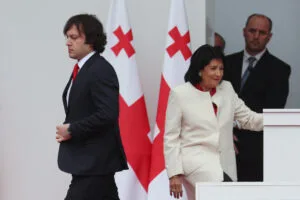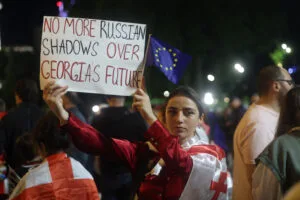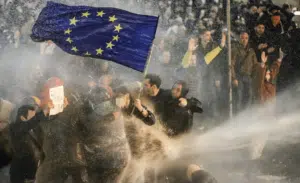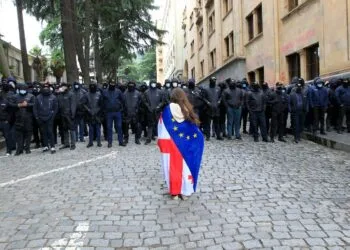Brussels – The clash with EU institutions is inevitable; no one in the ruling Georgian Dream party is doing anything to halt the diplomatic escalation. All to the contrary, the legislative process on the pro-Russian-inspired project on “transparency of foreign influence” is taking the fast track, and today (May 28), it has reached final approval. From now on, there are no other obstacles since the government and its parliamentary majority have overcome even the last one: the veto of the President of the Republic, Salomé Zourabichvili. Now, the diplomatic clash with Brussels is inevitable and will cause a slowdown in Georgia’s path to EU membership, at least until October 26, when citizens will vote for the Parliament.

After the first green light to the law (according to the ordinary legislative process) last May 14, a new, very rapid legislative process to overcome the decision of the head of state—who has always firmly opposed a law that disturbingly reiterates many elements of the same law in force in Russia—has begun. President Zourabichvili’s gesture was purely symbolic from the moment the government knew at the outset that it could use its overwhelming majority in Parliament to override the veto and make “foreign influence transparency” become law, as confirmed yesterday (May 27) in the Legal Affairs Committee and today by the entire Parliament with 84 votes in favour. “It is impossible to improve this law; in its entire content, it is unconstitutional, anti-European and anti-democratic,” attacked Georgia’s number one in justifying her veto.
National treason broadcasted to the rally. 84 in favor again. The Presidential veto on the Russian law has just been overridden. This is just the beginning – of their end. ✊ pic.twitter.com/tyry8Zh2DA
– Marika Mikiashvili (@Mikiashvili_M) May 28, 2024
The law on “transparency of foreign influence” was submitted last year by Georgian Dream and stalled after an oceanic wave of protests in March 2023. With a slight amendment to the text in early April, the law has been resubmitted by the government: All organisations receiving more than 20 per cent of their funding from abroad would have to register as an “organisation pursuing the interests of a foreign power” (similar to “agent of foreign influence” in effect in Russia since Dec. 1, 2022). After weeks of extremely high tension inside and outside the Tbilisi Parliament and tens of thousands of citizens animating the most significant wave of protests since the independence from the Soviet Union in 1991—every day continuously for two months—the ruling party has decided to pull straight on with its legislative initiative before returning to the polls on October 26, showing the willingness to increase the scale of violence deployed by riot police and balaclava-wearing officers against peaceful pro-EU protesters, who have never stopped taking to the streets by the tens of thousands every day.

Despite the Candidate country status received on December 14, 2023, from the European Council, in Brussels it is no longer a secret that the entry into force of the pro-Russian-inspired law would prevent the opening of EU accession negotiations, since the same negotiations are tied to progress on European Commission recommendations on civil society freedom and combating disinformation. It is no coincidence that the EU High Representative for Foreign Affairs and Security Policy, Josep Borrell, announced at the end of yesterday’s Foreign Affairs Council that with the 27 governments, “we have started to consider the most appropriate responses in case the law is implemented from June,” still urging the government led by Irakli Kobakhidze to “withdraw the law.
“However, it should not be forgotten that the unity of the 27 member countries (and consequently the Union) is blocked by the resistance of Viktor Orbán’s Hungary and Robert Fico’s Slovakia. For the first time, this deadlock was demonstrated mid-month, when a declaration by all 27 EU leaders should have been adopted to unequivocally condemn the law adopted by the Georgian Parliament. And the stalemate—especially with the constant threat of the Hungarian veto—has not yet been overcome after two weeks, as Borrell himself hinted between the lines, “For some the situation is not so grave and serious, while others see it as an attack against the laws and values of the EU.” Yet the EU high representative is looking for a way out to show the Union’s unity and intransigence against a law that is unacceptable for a country that aspires to become an integral part of it: “I would like member countries to be ready to take decisions whenever something occurs that does not correspond to our values, international law, and the European path, whether it is in Georgia or anywhere in the world.”
The complex relationship between the EU and Georgia
Despite being granted candidate status for EU membership, the relationship between Brussels and Tbilisi remains particularly complex—and now very tense—because of the disconnect between an overwhelmingly pro-EU population and a government of pro-Russian tendencies, the same one that applied to join the Union over fears raised by Kremlin expansionism. Over the past two years, several episodes have highlighted the ambiguity of the ruling Georgian Dream party. In May 2023, flights between Georgia and Russia resumed after Moscow decided to lift the current ban, and the Caucasian country never aligned with the restrictive measures introduced by Brussels against the Kremlin after it invaded Ukraine. Last fall, the government also attempted—but failed— to put under impeachment the President of the Republic Zourabichvili for a series of trips to the European Union that allegedly violated the powers of the head of state under the national Constitution.

However, the Georgian population has shown for years that it does not share the direction taken by Georgian Dream, and this is one reason why the elections for parliamentary renewal on October 26 will be crucial. Straddling Brussels’ decision in June 2022 not to grant Georgia candidate status for the time being, two major pro-EU demonstrations took place in Tbilisi: one “March for Europe” to reiterate the people’s alignment with the values of the Union and a public call for government resignation (with no follow-up by the then Garibashvili-led executive). The common features highlighted from these demonstrations are the flags—white and red of the five crosses (national) and with the twelve stars on a blue field (of the EU)—placards with pro-European claims and the Georgian anthem mixed with the Ode to Joy. A year later, harsh widespread protests broke out in March 2023, supported by Brussels, which led to the momentary shelving of the controversial bill on “transparency of foreign influence” until it was passed this spring amid a new wave of popular protests.
In this scenario, one should not forget Georgia’s particularly sensitive relationship with Russia, a country with which it borders to the north. Its candidacy for EU and NATO membership, enshrined in its national constitution, has long been a cause of tension with the Kremlin. After conflicts in the 1990s with the two separatist regions of South Ossetia (1991-1992) and Abkhazia (1991-1993) following Georgia’s 1991 independence from the Soviet Union, on the ground, the situation was effectively frozen for 15 years, with troops of the newly formed Russian Federation defending the secessionists within the claimed territory. The attempt to reassert Tbilisi’s control over the two regions in the summer of 2008—intended by then-President Mikheil Saakashvili—led to a violent Russian reaction on August 7, not only in repelling the Georgian army’s offensive but also leading to the invasion for five days of the rest of the national territory with tanks and air raids. Since then, Vladimir Putin‘s Russia has recognised the independence of Abkhazia and South Ossetia and has deployed thousands of soldiers to the two territories to increase its sphere of influence in the Ciscaucasia region, in violation of the August 12, 2008 agreements.
English version by the Translation Service of Withub









